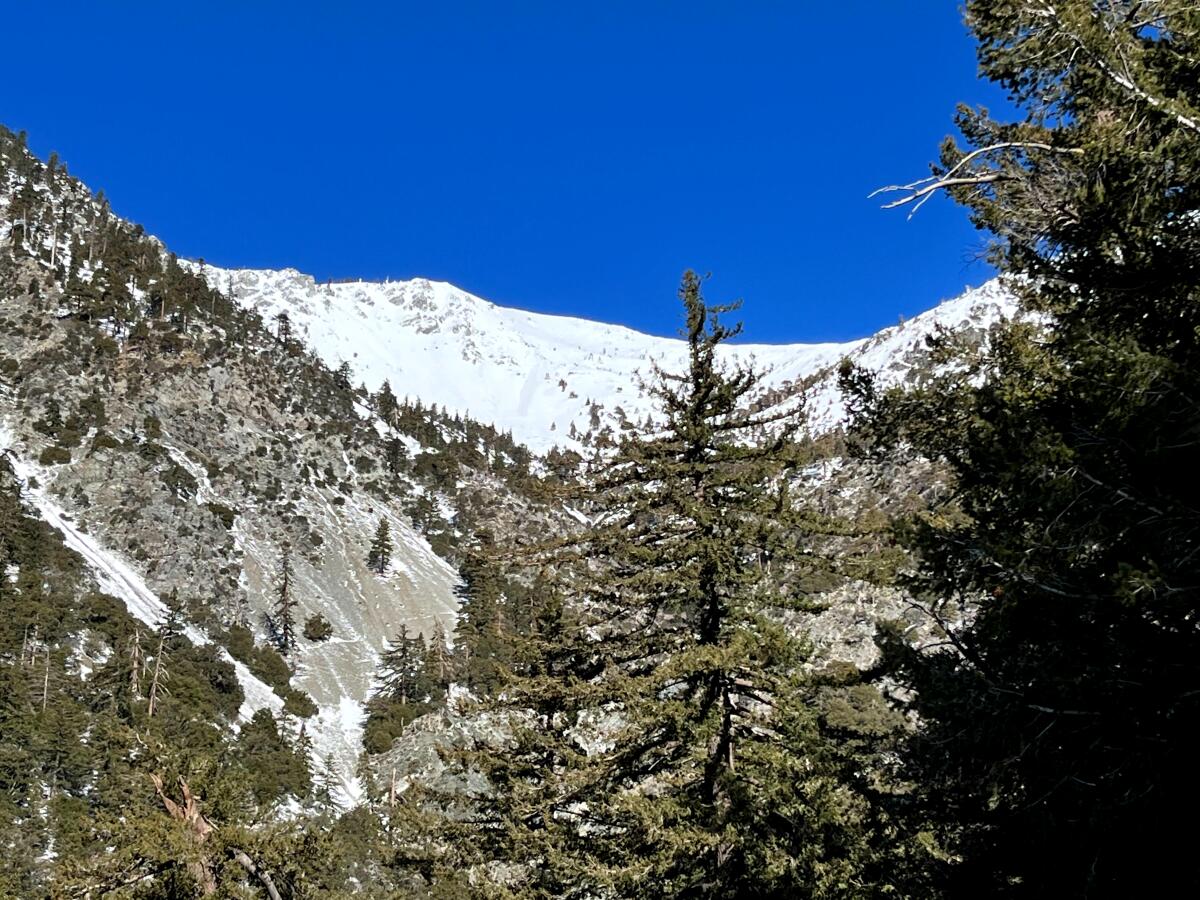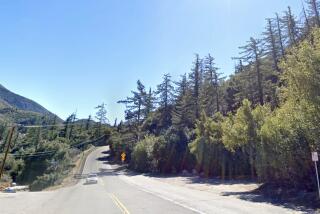Commentary: Stay off Mt. Baldy. It’s dangerous, and rescue workers deserve a break

Think of Timothy Staples if you’re considering a hike up Mt. Baldy right now, while it’s covered in snow and ice.
In December 2019, Staples was a search-and-rescue volunteer looking for a missing hiker on the 10,064-foot-high mountain, the tallest of the San Gabriels. Baldy, formally Mt. San Antonio, sits close enough to Los Angeles to appear on just about every postcard of the downtown skyline. On a clear winter day, the view of the snow-capped peak beckons hikers who’ve had enough of sunny and 80 degrees to try something radically different.
Three years ago, when one of those hikers went missing in poor weather, Staples and 125 other people set out to find him. Sadly, the search was suspended not when the hiker was found (his remains were discovered the following June), but when Staples slipped on the mountain and died. He had been a search-and-rescue volunteer for nine years.
I think about Staples and every other rescue worker whenever someone goes missing in the San Gabriel Mountains — and there have been a lot of them lately. In January alone, 15 lost or hurt hikers have been recovered from the area around Baldy, and at least two tragically have died.
The rescue workers who looked for them in dangerous conditions selflessly provide a safety backstop so we outdoor enthusiasts can explore the wilderness at Los Angeles’ doorstep. At a minimum, the rescuers deserve our good judgment of whether it’s too dangerous to venture out.
And right now, as a semi-serious hiker, I can tell you that the smartest and most considerate mountaineers are staying home. It’s too dangerous to be on Baldy.
None of my three trips to Baldy’s summit has been in the winter, but even in the summer it’s a serious hike on a big mountain.
At many places above 8,000 feet, the trek is steep, slippery and grueling in ways that surprise me every time. Didn’t bring a jacket? You’ll regret it. All the sweat you’ve accumulated pulling yourself up over 10,000 feet will make you shiver the moment you stop at the exposed, expansive, wind-swept summit.
And then there’s getting down. Depending on the route you choose (there are several) you’ll contend with scree or sandy trails, either of which work with gravity to yank your feet out from under you. I’ve encountered ice on the colder north-facing slopes as late as June.
Although this describes a “routine” hike up Baldy in the summer months, it doesn’t begin to show how dangerous Baldy is now. When I visited the main trailhead at 6,100 feet recently, much of the ground was completely iced over; imagine, then, how treacherous things must be around 9,000 feet, far away from help.
At least two signs on the road warned “Icy Trails” and “Hiking Not Advised,” and the trailhead information kiosk contained only a poster describing “extreme alpine conditions” and listing recommended winter gear.
This is where hardened mountaineers might feel prepared to push on. After all, they can do things like spot snow cornices or assess avalanche danger, and they know how to use crampons and ice axes. That’s all very well, but the search-and-rescue workers deserve a break, and every adventurer on the mountain is a potential search-and-rescue client.
Consider, also, that people who go missing in the mountains often are experienced, safe hikers. Even the most enthusiastic and knowledgeable Baldy regular, a 78-year-old man who reached the peak more than 700 times, slipped and died on the mountain in 2017. Accidents often happen through no fault of our own, even to the most skilled and fit of us. That’s even truer in the winter.
Hikers tend to be aware of all this. Talk to us indoors, and we’ll go on and on about safety first and knowing our limits and carrying the “Ten Essentials.” But put us within view of a mountain, and our minds can too easily find ways around all those safety warnings.
That’s the thing about living as a hiker in L.A. — we’re almost always within view of those mountains, and the majestic Mt. Baldy calls out like a siren in the winter. Just take the 210 Freeway east, get off in Claremont and soon you’re hiking in an alpine wonderland. Sounds as simple as driving to Disneyland.
Don’t listen to that call, at least for now. Make that choice for yourself. If that isn’t enough, make it for search-and-rescue workers like Timothy Staples.
More to Read
A cure for the common opinion
Get thought-provoking perspectives with our weekly newsletter.
You may occasionally receive promotional content from the Los Angeles Times.











